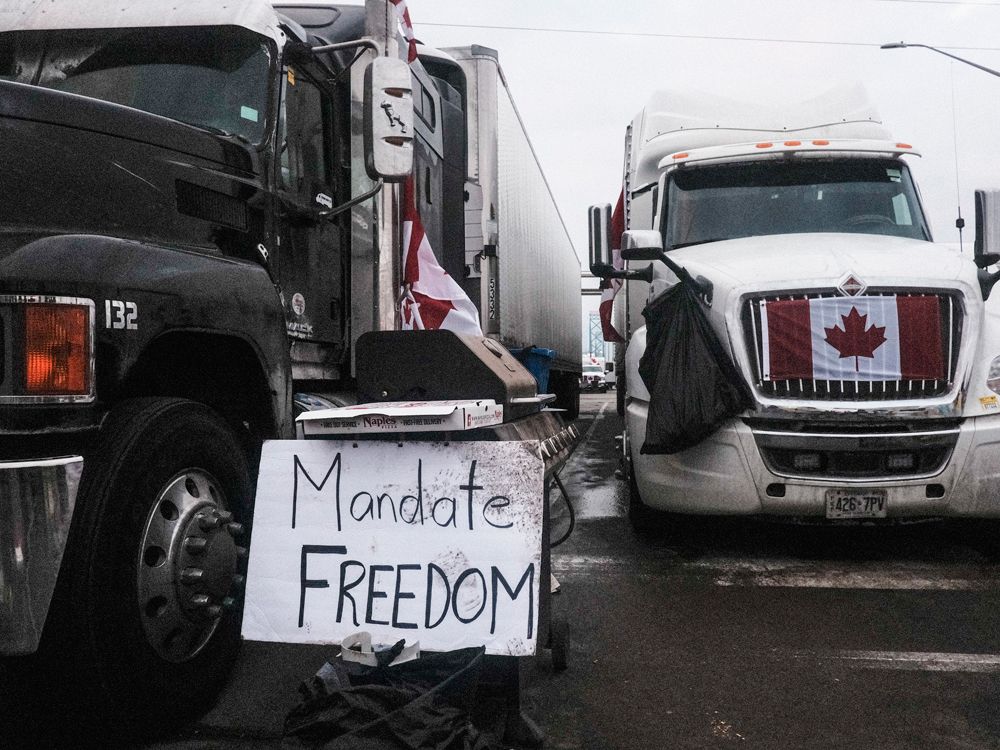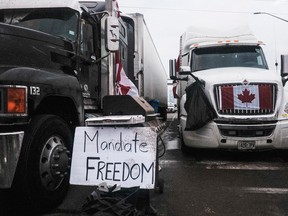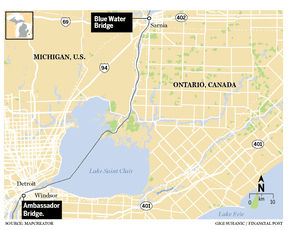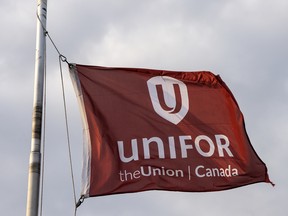Ambassador Bridge blockade is starting to hit the economy on both sides of border

Protests against COVID-19 restrictions are going viral in Canada and are starting to threaten the economy. Get live updates here

Article content
Protests against COVID-19 mandates continue to snarl the streets of Canada’s capital and cripple cross-border crossings in Ontario and Alberta, blocking vital routes for goods.
Advertisement
Story continues below
This advertisement has not loaded yet, but your article continues below.
Article content
The demonstrations began when the self-described “Freedom Convey” descended on Ottawa on Jan. 28, to protest the federal government’s move to require that Canadian truck drivers crossing the U.S. border be fully vaccinated. It has since evolved into a protest against all public health measures aimed at fighting the COVID-19 pandemic. Organizers say they will not end their protest until all measures are dropped.
Below are live updates on what’s happening across Canada today.
11:40 a.m.
Michigan governor calls for end of economic blockade
Michigan’s governor is calling on Canadian authorities to end the protests at two busy border crossings affecting her state.
Gov. Gretchen Whitmer said the blockade at the Ambassador Bridge connecting Windsor and Detroit, and the Blue Water Bridge in Sarnia, Ont., is threatening her state’s economy.
Advertisement
Story continues below
This advertisement has not loaded yet, but your article continues below.
Article content
She said local, provincial and federal governments in Canada must de-escalate what she called an economic blockade.
Whitmer called on Canadian authorities to “take all necessary and appropriate steps” to immediately reopen all lanes of traffic.
Meanwhile, interim Conservative leader Candice Bergen has said the time has come to end border crossing blockades causing economic harm.
Speaking in the House of Commons, she said farmers, manufacturers, small businesses and families are suffering because of the border blockades.
— The Canadian Press

11:35 a.m.
‘It just needs to stop’: Ontario auto workers back on the job, but parts could run out anytime
The Canadian private-sector union representing roughly 40,000 auto workers says its members are back to work at Ontario’s major assembly plants this morning, after the Ambassador Bridge blockade forced automakers to cut back production across the province yesterday.
Advertisement
Story continues below
This advertisement has not loaded yet, but your article continues below.
Article content
But Unifor spokesperson Shane Wark said it’s not clear how long plants will be able to operate today before they run out of parts again, due to a shortage of shipments crossing the clogged U.S.-Canada border.
Wark said Ford Motor Co. plants in Windsor and Oakville, Ont., reduced work hours on Wednesday because of part shortages. So did the Stellantis N.V. plant in Windsor, and the General Motors Co. plant in Oshawa.

“It just needs to stop,” he said. “We’re just going on a day-by-day, hour-by-hour basis right now.”
Auto workers have already been “suffering” sporadic layoffs throughout the pandemic because of a global microchip shortage that has interrupted production at plants.
“People have the right to protest. You’ll never hear us challenge that,” said Wark, assistant to the national president at Unifor. “Their method of trying to get everything to reopen is by shutting down the most important international crossing in North America? It just doesn’t make sense to me.”
Advertisement
Story continues below
This advertisement has not loaded yet, but your article continues below.
Article content
(Unifor, the largest private sector union in Canada, represents employees in the Financial Post’s Toronto newsroom.)
— Jake Edmiston
11:25 a.m.
Advertisement
Story continues below
This advertisement has not loaded yet, but your article continues below.
Article content
11:15 a.m.
‘This is simply not sustainable’
The Canadian Trucking Association is calling on governments to come up with a plan to put an end to blockades that are choking the supply chain and negatively impacting its drivers.
In a statement released Thursday morning, the CTA said protesters are taking illegal hostage of public roads, causing significant losses for businesses.
Truck drivers are being unfairly caught up in the demonstrations, the association said, and pointed out that many of the protesters involved are not actual heavy-haul truckers.
“The trucking industry and its drivers are paying a heavy price for the unlawful actions of those who choose to politicize and target our borders and highways and choke off trade between Canada and the United States,” Stephen Laskowski, president of the Canadian Trucking Alliance, said in the statement.
Advertisement
Story continues below
This advertisement has not loaded yet, but your article continues below.
Article content
Lskowski said some of its drivers have been stuck at blocked border crossings for up to eight hours, and many have no access to food or washrooms.
“The only people who these blockades hurt are the hard-working Canadians who have kept our nation moving,” Laskowski said.
“This is simply not sustainable for the industry, its customers, and ultimately the consumer.”
10:40 a.m.

Police are urging motorists to avoid the Ambassador bridge in Windsor, even though it is open to U.S. bound traffic, warning of “significant delays.” The Blue Water Bridge in Sarnia is reporting two-hour delays at 10 a.m.
Advertisement
Story continues below
This advertisement has not loaded yet, but your article continues below.
Article content
9:05 a.m.
‘We’re kind of used to getting punched in the face’
That’s how Rod Wildeboer, chief executive of Martinrea International Inc., one of Canada’s bigger makers of automobile parts, summed up how he’s feeling in a story by the Washington Post.
Bank of Canada Governor Tiff Macklem said on Feb. 9 that the economic impact of the border blockades will be “measurable” if the protests last much longer. That’s because car and truck parts worth hundreds of millions of dollars move back and forth between Southern Ontario and Michigan each day via the Ambassador Bridge. If those parts stop moving, companies such as Martinrea only have so much space to stockpile production. When the space runs out, the next step is to cancel shifts.
Advertisement
Story continues below
This advertisement has not loaded yet, but your article continues below.
Article content
“We make big stuff,” Wildeboer said in the Post. “We can’t keep production going and have stuff piled up in our yards. The yard would be full in a day and a half.”
The blockades have started disrupting production.
Both Ford Motor Co and Toyota Motor Corp said on Wednesday they had been forced to halt some operations because of supply chain disruptions stemming from protests that have snarled traffic at the Ambassador Bridge connecting Detroit and Windsor. Chrysler-maker Stellantis has also been disrupted.
Toyota, the top U.S. seller, said it was not expecting to produce vehicles at its Ontario sites for the rest of the week.
Ford’s engine plant in Windsor is shut down and the schedule cut back at its Oakville assembly plant outside Toronto that makes the Edge model, spokesperson Said Deep said Wednesday an email. The automaker is continuing to ship engine inventory to U.S. plants, he added.
Advertisement
Story continues below
This advertisement has not loaded yet, but your article continues below.
Article content
General Motors Co said today it was forced to cancel two production shifts at a plant in Michigan where it builds sport utility vehicles as a result of the Canadian trucking protests.
Aurora, Ont.-based Magna International, Canada’s biggest parts maker, said it had shifted some of its shipments to alternative border crossings, the Post said.
The pandemic has wreaked havoc on the automobile industry for the better part of two years. If drivers didn’t realize they were essentially driving computers before, they do now, as an acute shortage of computer chips crippled production.
Some of that is reflected in Martinrea’s stock price, which is down about 30 per cent over the past year, the Post reported.
Wildeboer might be used to the sensation of being punched in the face, but it still must hurt.
Advertisement
Story continues below
This advertisement has not loaded yet, but your article continues below.
Article content
– Kevin Carmichael
7:40 a.m.

Checking in with Canada border services:
The Ambassador Bridge in Windsor is still listed as “temporarily closed” as of 7:14 a.m. this morning, with waiting times at the nearby Blue Water Bridge in Port Huron, to which some traffic is diverting, listed as three hours.
The protestors, who are in support of the Truckers Freedom Convoy in Ottawa, have blocked traffic in the Canada-bound lanes of the bridge since Monday evening. Approximately US$323 million worth of goods cross the Windsor-Detroit border each day at the Ambassador Bridge, making it North America’s busiest international border crossing.
The delay at the Canada, U.S. border crossing at Coutts, Alberta, where another protest is stopping traffic, is listed as seven hours.
Additional reporting by Canadian Press, Reuters and Bloomberg
Advertisement
Story continues below
This advertisement has not loaded yet, but your article continues below.





